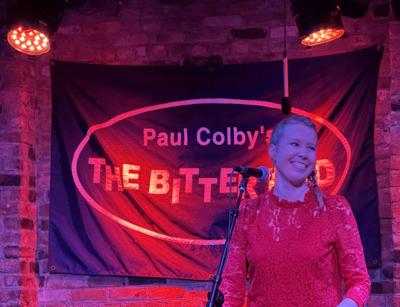One by one, songbirds fall from the wire. This year barely had begun before “Soul Man” Sam Moore went to that rock ‘n’ roll cloud in the sky. I was privileged to work with Moore and other soul men and women for a Smithsonian tribute to Ray Charles.
As part of a short film about it, “ WETA at the White House ,” I got to visit Ray’s offices, preserved in a lost part of Los Angeles. I saw where Charles would lower the Murphy bed in his office. I couldn’t resist.

(It still works!) Blind, he knew every inch of his space. When I stepped into his walk-in closet, with its hundreds of stage outfits, I knew that he could sense their shine, the cut of each cloth. His baritone could be heard across the curve of the earth — a songbird now among the angels.
Shortly before Moore left us, a lesser-known great, Josh White Jr., climbed up that heavenly tower of song at Christmastime. Like his father, the bluesman whose lament “One Meatball” gets sung every time we serve spaghetti, White Jr.
had a voice to soothe your soul. As a teen, I would walk five miles to Greenwich Village and five miles back, all so I could hear heroes like this play at my favorite club The Bitter End. “The sure sign of a misspent youth,” my father used to say.
I emulated folklorist Alan Lomax, lugging my audiocassette recorder to the shows. I sensed even then that these legends wouldn’t be around forever. Hearing them, I knew why the caged bird sings.
The concrete canyons of Manhattan receded below as my ears carried me aloft. I hadn’t been back to my Village haunts in 50 years when I found myself at The Bitter End last winter, for a benefit concert staged by a gifted singer-songwriter of today, Emily Cavanagh. A sucker for a song, I later went to work for her nonprofit, “A Song for You.
” That title, on a cold evening on Bleecker Street, was the same as Leon Russell’s hit from 1971 — a seminal year as well for other singer-songwriters. I thought first of James Taylor, who still makes the Berkshires seem dreamlike. Then I remembered the night that fall when I met John Prine, together with his transcendent musical companion Steve Goodman.
COVID-19 took Prine in the pandemic; leukemia stole Goodman from us years ago. If you’ve ever heard Arlo Guthrie sing “City of New Orleans,” that’s Goodman’s song. That first generation of singer-songwriters was a golden era.
Before that, there were songwriters in New York’s Tin Pan Alley and the Brill Building, and there were interpreters. Bob Dylan and The Beatles changed all that. The authenticity of singing one’s own compositions had a special something.
The American Songbook stands forever, but it was different. In the last years of his life, my father had a stock answer to my daily “How are you doing?” It was always “Tired of living, scared of dying,” from “Ol’ Man River” in 1936’s “Showboat.” For fans of the musical, if this rings a bell, don’t hunt up Paul Robeson’s popular take, because it omits this killer line.
Instead, try to locate William Warfield’s more obscure version . I found it on a moldering disc, but you can find it on CD or your music streaming service of choice. The Bitter End triggered a musical tsunami for me.
When I heard Cavanagh cover Prine’s “Angel from Montgomery,” I sequenced it in my head with Bonnie Raitt’s hit version. Down the rabbit hole, that led me to her father, tenor John Raitt, in “The Pajama Game.” My father wore out its grooves, alongside Harry Belafonte, Burl Ives, Pete Seeger and the Kingston Trio.
They delivered a punch from mono LPs, with mixes crafted for AM radio. But for film fans, only Seeger gets his due in the Dylan biopic “A Complete Unknown.” Dylan, the prince of paupers, soldiers on at 83, the song-and-dance man he dreamed of becoming back home in Hibbing, Minn.
, up on the iron range. His songs, like others of the Sixties and Seventies, are Proustian madeleines. My wife puts up with me singing off-key as I ramble through the house.
A dusty library of song holds the shells in which my only pearls of wisdom were formed. They are my church. Dylan, in the love-and-theft of “the folk process,” cribbed a tune from the ballad “Lord Franklin,” and married it to words that stuck with me: “I wish, I wish, I wish in vain that we could sit simply in that room again.
” There yet remain a few birds on the wire for the “Wichita Lineman” to hear singing through the whine. Such sweet sounds at the bitter end..
Politics

Even at the bitter end, a songbird's tune is still sweet

One by one, songbirds fall from the wire.















